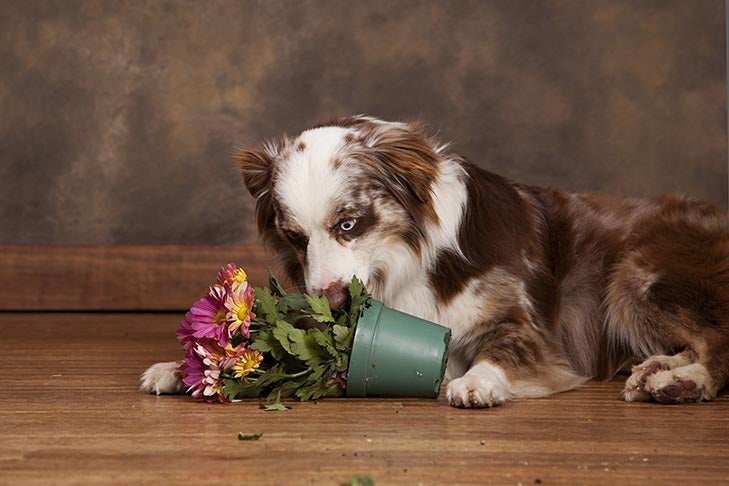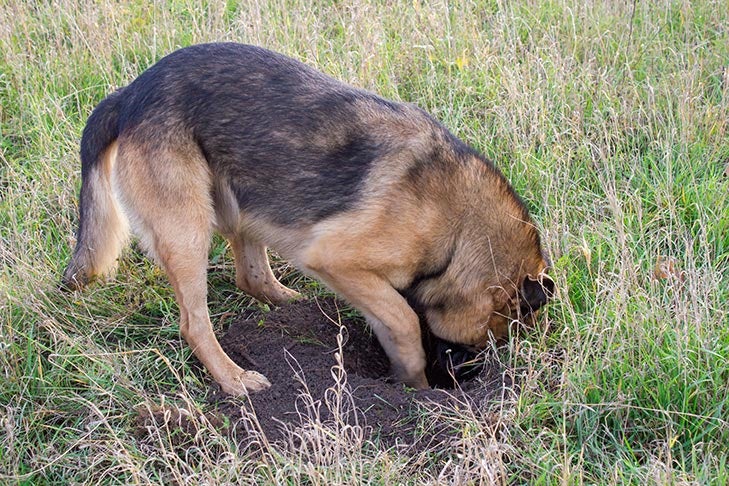Clubs Offering:
As a pet owner, you may have caught your dog eating (or attempting to eat) some pretty weird stuff. But have you ever observed your pet snacking on straight-up dirt?
Holistic veterinarian Dr. Laurie S. Coger, DVM, explains, “Dirt eating is a form of what is termed ‘pica,’ the ingestion of nonfood materials. There are many causes, including nutritional, behavioral, and physical. Stress or boredom can also lead to eating all sorts of things, including dirt.”
If your dog is continually eating dirt, you shouldn’t discount this behavior. It could be a sign of a bigger issue, such as:
Dr. Coger notes that while stomach and gastrointestinal issues could be to blame for your dog’s interest in dirt, canines are more likely to seek out grass in these cases. “If [the dirt eating] is frequent, intense/manic in nature, or large quantities are consumed, then it’s time to go to the vet,” she says. “Changes in stool would be another sign that a vet visit is in order. Bloodwork to look for underlying abnormalities may be helpful in pinpointing a cause.”

As you may expect, there are risks to letting your dog continually eat dirt. The main risk is impaction of the intestine (hardened stool that gets stuck in the body due to long-term constipation) if your dog eats a lot at once. Impaction often means surgery. “
The dirt could also contain pesticides, fertilizers, or other toxins that could reach toxic levels if enough dirt was ingested,” Dr. Coger adds. “Depending on the dirt, dental damage or wear could also be a concern.” If the dirt has rocks in it, for example, it could cause damage to your dog’s teeth and cause obstruction in the throat or any point along the digestive tract. Sharp sticks could puncture the linings of your dog’s mouth, throat, intestine, or stomach. It’s also possible that your dog could ingest a parasite along with the dirt, which can cause a range of additional health issues.
“I would add that any new, unnatural behavior, such as dirt eating, should be acted upon quickly,” Dr. Coger says, “both because of possible serious underlying causes and before it becomes a habit. Dogs will learn from other dogs in the house, and who wants a houseful of dirt eaters?”

If you’re worried that your dog’s dirt eating is due to a nutritional imbalance, you should consult your veterinarian about your canine companion’s diet and whether changes need to be made. On the behavior side, make sure your dog is getting enough physical and mental exercise to curb dirt eating that stems from boredom. If all else fails, “denying access to favorite dirt-eating areas may be required,” Dr. Coger says. Remember, dirt eating may be a sign of something bigger, so you should never ignore it.
Tasty Dirt
A less serious cause is simply that your dog is going after something tasty, like bacon or hamburger grease under a grill. Check the area to make sure there isn’t something your dog is trying to get to … especially if he keeps going back to it!
Humans exhibit strange habits out of stress and boredom – hair twirling, knuckle cracking, overeating, etc. Same goes for our pets who are designed to be active and outdoors, and who don’t always get all the stimulation they require.
Picture a large working dog being stuck home alone all day… He’s probably going to find a way to entertain himself, possibly by eating dirt.
“Some dogs, especially youngsters and puppies may simply eat dirt out of pure boredom,” says Osborne. “This could be from a multitude of reasons such as lack of exercise, being cooped up in a kennel during the day, not enough playtime, or a lack of proper social interaction. Remember, dogs, like people, need a job and a daily purpose, especially when dealing with herding and high-energy breeds. In general, dogs enjoy jobs, so if your canine’s behavior seems out of sorts, give him something to do. Doggie day care facilities offer unlimited opportunities for socialization and human and canine interaction. In addition, they relieve boredom and for most are just plain fun!”
Like humans, dogs can also have obsessive-compulsive disorder. A dog with OCD may start to eat dirt obsessively as part of the disorder. If you suspect OCD or a related behavior disorder, consult with your holistic vet or an animal behaviorist.
“Eating dirt” sounds so strange, but in fact some clay can be used to soothe digestive problems, help with parasites and for detoxification.
Could it be our dogs are instinctively trying to soothe or detox a digestive issue by eating dirt? It could very well be so.
“My instinct is that the dog is looking to get whatever is in the digestive tract moving out, either by throwing up or by pushing it through,” says Coger. “Dirt could act as mild abrasive to ‘scrub’ clean the inside of the intestines. It could also stimulate more contractions of the intestine, moving material through the digestive tract more quickly.”
Why Does My Dog Eat Dirt?
Your dog’s desire to eat dirt may be caused by nutritional, behavioral, or medical reasons.
All dog foods are not created equally. Some diets do not contain all the nutrients that a dog needs to live a healthy lifestyle.
Dietary deficiencies can cause dogs of any age to eat dirt to obtain minerals, like sodium, iron, and calcium from the soil. Dogs that are underfed may also eat dirt and other objects due to hunger and nutritional deficiencies.
When selecting a good quality dog food, make sure the food you choose meets the World Small Animal Veterinary Association (WSAVA) nutritional guidelines and is made by a large, experienced, and reputable manufacturer. Brands such as Royal Canin, Hill’s Science Diet, and Purina all meet WSAVA guidelines.
Dogs can get bored if they don’t have enough exercise or enrichment, and some will eat dirt to occupy their time.
Dogs with separation anxiety may eat dirt due to stress when they are separated from their pet parents. Dogs can develop anxiety at any age.
Several medical issues can also cause dogs to want to eat dirt.
This medical condition refers to a low red blood cell count. Anemia can be caused by a variety of things, such as hookworms, flea infestation, tick disease, cancer, immune-mediated diseases, or bleeding disorders.
It is more common for puppies to have hookworms since they can typically contract these parasites through their mother’s milk when nursing. However, dogs of any age can get hookworms from the environment if they are not on heartworm prevention.
All dogs are prone to fleas and ticks, which are blood-sucking parasites that can cause severe anemia. Keep your dog on a good flea/tick prevention year-round, such as Simparica, NexGard, or Bravecto.
Adult and senior dogs can develop a severe anemia due to internal bleeding from certain types of cancerous masses. Immune-mediated diseases and bleeding disorders are very rare but can also cause anemia in a dog of any age. Any anemia, if severe enough, can cause a dog to eat dirt.
A shunt is an abnormal blood vessel that allows blood to bypass a dog’s liver. As a result, the liver receives an inadequate blood supply and does not function properly. Shunts are rare but can be congenital (in puppies) or seen in adult or senior dogs.
When dogs have an upset stomach, they sometimes eat dirt and/or grass to try to make themselves vomit.
Why Do Dogs Eat Dirt (and how to stop them!)
Dogs do a lot of odd and seemingly random things that make us pause to scratch our heads. Eating dirt is no exception. So why do dogs eat dirt? If you catch your dog eating dirt, you need to pay attention to how much they eat and how often they do it to determine if there is an underlying health issue.
If dirt eating is something they have done once or twice but have not made a habit of, you do not have much to be worried about. If you notice your dog eats dirt and digs around in it religiously, however, you’ve got a bit of a problem.
Read on to learn why dogs eat dirt, what it means for your dog’s health, and what dog parents should do in order to get their four-legged BFF to kick the habit.